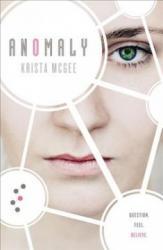
"Anomaly" a Christian dystopian novel grabs a reader's attention quickly. Thalli, the main character, is being chased by The Ten, a group of scientists who are trying to annihilate her. According to The Ten, Thalli is considered an anomaly and is dangerous to their current society. Through many trials, she has learned about the Designer from a friend named John. He shares with her that she was made to be like this and that she has been being lied to her whole life. She then realizes that she needs help; help that cannot come from humans. She needs the Designer's help. With some help from a few friends, Thalli tricks the ten scientists into thinking that they have cued her, but it doesn't work. They find out that she was tricking them. The Ten then decide to annihilate them all. As Thalli bravely volunteers to go first, her friends try to rescue her. Will she make it to freedom or will she be stuck in The Ten's grasp and never make it out?
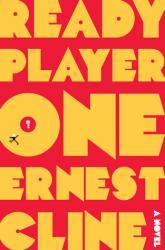
I was given Ready Player One for my birthday. I would suggest this book to readers interested in science fiction and immersive video games. The author writes with surprising detail, going through Wade's thought process and adding twist and turns at each chapter. The author makes semi-relatable characters, fighting to win the ultimate prize. The entire book speaks of the time, heart, and soul the author spent writing a fabulous book.
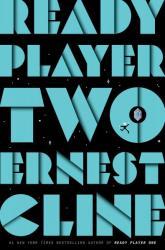
I received Ready Player Two as a gift. I would suggest this book to anyone who enjoyed the first book. Although this book is not as good as the first one, I enjoyed it immensely. Wade hunts down shards for a new Easter egg in the oasis. Wade's compelling character meets new people and gains a completely new quest. Ernest leads you on a journey you don't want to end.
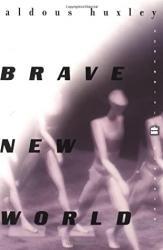
Brave New World is a classic dystopian novel, written in the early 1930s by Aldous Huxley. Set in a society in which humans are manufactured and programmed depending on their assigned social class, it addresses individualism, conformity, and the dangers of complete government control. Citizens in this dystopia frequently take a drug to subdue their emotions, living in a state of ignorance and 'bliss' as they go through the motions unquestioningly. In order to keep the system of manufacturing people running smoothly, certain things are considered taboo--such as literature, religion, and family--while what we typically consider unorthodox is commonplace in this society.
The story follow several central characters who don't completely fit in or believe there could be more to life than what they experience every day. Huxley takes readers to a 'Savage Camp' where John, the protagonist (whose ideals are completely different from everyone else's), is introduced, and the other characters experience an extreme contrast to their advanced and ordered society. Readers experience John's intense internal conflict as he attempts to find his place in the new world into which he is thrust; they also learn more about the ideology of the dystopia, and what goes on behind its 'perfect' facade.
I enjoyed most aspects of Brave New World, and would recommend it to dystopian readers who appreciate a deeper meaning. However, there were some parts of this novel that I found disturbing, as what's considered taboo is the opposite of how we view things in our world. Sometimes I had trouble connecting with the story emotionally, and I would've liked more specifics about how the dystopia came to be. But looking past the negatives, the themes Huxley brings up are very important, and even pertinent to society today. His characters have depth, the underlying themes make readers think, and overall it is an interesting concept of a future world with complete dictatorship. Brave New World is a classic that I believe everyone should read.
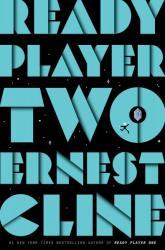
Ernest Cline has written another masterpiece. While Ready Player One could have remained a stand-alone novel, Ernest Cline has given us a better look into his dystopian universe with this sequel. After James Halliday posthumously releases another quest, The High Five must once again unite to solve all of the riddles. However, this time the stakes are higher as the lives of the majority of OASIS users are on the line. With adventures that include John Hughes movies, Prince, The Lord of the Rings, and many more pop-culture references, Ready Player Two is a thrilling action-packed adventure. I highly recommend this novel for any middle school or high school aged reader, or any lover of pop-culture from the later part of the previous century.
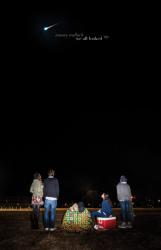
The book We All Looked Up is from the point of view of what would happen if the world was ending very soon. There is no certainty that the world will end but they also can't be sure that it won't. I really enjoyed this aspect of the book, the uncertainty that there is throughout the whole story. I thought the choices the characters made were realistic and that it was all very well thought out and written. I loved how the book made me think about what I would do if I only had a certain amount of time left to live and what I would want to be doing with this time.
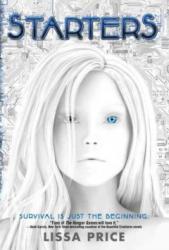
I read this book for school Freshman year of high school. It’s about a girl named Callie who lives in the future where everybody from 20 years to sixty years old has died. Old people can take control of younger peoples' minds, so they can ‘be young’ again. To me, it just felt like a poorly executed variation of the Hunger Games. I wouldn’t really recommend this book as I thought it wasn’t very well-written and had a poorly thought out story-line.
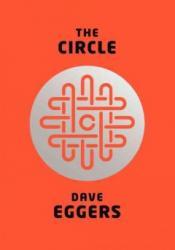
The Circle is an incredibly interesting book. The novel centers around Mae Holland, who sets off to work at The Circle after graduating from college. As she works through her career, Mae starts to question this highly acclaimed tech company and its Three Wise Men. Its main ideas discuss privacy, and specifically, how corporate run privacy standards lead into modern governmental systems. The ideas play into the fascinating world building around Mae Holland and her ideas of digital utopianism. The way she questions mob mentality behind the hive mind that can be global datafication is unique and provides for a great read. While the characters are somewhat lack luster, the novel makes up for it with its social construction and suspense. While there are some plot holes, the holistic concept is incredible. Overall, I would recommend this book to anyone interested in the digital world or dystopian-like settings.
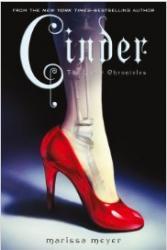
For years, I had heard of The Lunar Chronicles and thought people were referring to the two Sega Saturn video games, Lunar: Silver Star Story and Lunar 2: Eternal Blue. However, seeing as most people haven’t heard of these video games, I eventually figured out that they referred to the Young Adult series of books. While 2012 was definitely around the height of the re-imagined fairy tale craze, I do have to admit that this science-fiction take on these classic stories is a fresh new way of adapting the plots that we all grew up with through Disney movies.
The first book in the series, Cinder, takes Cinderella's down-and-out heroine and updates her to a cyborg unaware of her royal origins. What made this story engaging was figuring out how the standard trappings of the Cinderella story would be adapted to this futuristic setting. Granted, this made some of the plot points more than obvious well before they happened, but I usually ended up smiling at the bits of homage that Cinder paid to its origins—such as a “pumpkin” of a car and the leaving behind of certain footwear.
While the plot was mostly predictable, I appreciated the awkward “teenager” dialogue of the titular protagonist but only to a point. I’ll admit that YA books have a kind of frenetic style that matches their main characters' emotional turbulence, and Cinder certainly reads like a teenage girl replete with the insecurities, slang, and missed steps that a full-grown adult wouldn’t necessarily have as character quirks. The problem is that having to follow such a snarky young individual for so long through the story makes it eventually grate on my nerves, especially when the path she needs to take in her life is so obvious. Then again, perhaps I’m just a crotchety old man who isn’t in-tune with the youth anymore.
A great sci-fi Cinderella retelling, I give Cinder 4.0 stars out of 5.
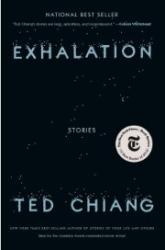
My librarian uncle introduced me to Ted Chiang recently, and I was so intrigued by such an award-winning author who wrote exclusively in short stories that I had to check out one of his books. Exhalation is a collection of these stories, and I can see why Chiang is lauded as a writer. It seems that modern science fiction is too focused on new technologies and how they can lead to utopias or dystopias. In Chiang’s stories, I saw some stark realism that took well-tread topics of the genre and examined them through a lens that was extremely realistic to how society would function with such advancements.
It was refreshing—a sigh of fresh air, or exhalation, if you will—to read stories about parallel universes, artificial intelligence, and time travel that didn’t stick to the same tropes that have made science fiction almost boring in comparison. In the end, Chiang is so concise with his language as to create these universes anchored in our reality and uncover all the intricate ways in which new technologies would change it without delving into the fluff of a full-blown novel. And perhaps that’s what makes these short stories work: focusing on how people interact with new technology, instead of just society at large.
These stories' personal nature hits home, mostly because they were pulled from current technologies and extrapolated into the fringe sciences that are on the cutting edge. For instance, we already record much of our days, so how does our memory change if we have a perfect record of the past? Additionally, how many technologies are made widely available as entertainment first, and how many interest groups pop up as fans of these technologies until they are eventually made obsolete? These and many other thoughtful topics are only some of the reasons I would recommend any fan of true sci-fi read this book.
A collection of some of the best sci-fi stories I’ve ever read, I give Exhalation 5.0 stars out of 5.
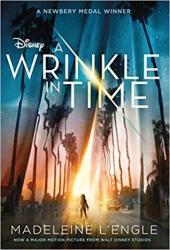
A Wrinkle in Time is unlike any Science Fiction novel I have ever read. It is exciting and scientific and even a little romantic like every other science fiction novel, but it grapples with other ideas like how one thing (yet to be revealed) helps to conquer the darkness inside us and all around. It follows Margaret (Meg) Murry in the search for her missing father but at the same time follows a search in understanding herself. She wants more than anything to find her father because he was the one who made her feel like herself and now that he is gone, she feels lost. Her genius younger brother Charles Wallace is a major player in Meg's journey to find herself and in the end is what will trigger the one thing she has that the darkness does not.
I first read this book in third grade as required reading, but since then I have probably read it over ten times. It is one of those books that you get something new out of every time you read it. I have also never read such a creative book. Madeleine L'Engle makes it interesting and unpredictable while at the same time tying in internal struggles. Everyone can relate to Meg and will learn from her struggles by reading this book.
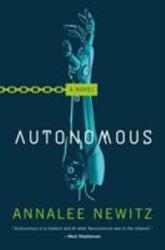
Science fiction often seeks to answer the moral and ontological questions that we’ll soon face in future technological landscapes. When I picked up Autonomous, I was expecting an examination of artificial intelligence and the ability for robots and machines to eventually become sentient. Unfortunately, that was only about half of the book that I ended up reading. The fact that there were two dueling scientific topics in this book made its message muddled, let alone misleading. It really should have been branded/titled as a book about pharmaceuticals and the patent system that holds the healthcare system hostage.
While I’m sure the pharmaceutical elements of this story are accurate (at least in a fictional context), this wasn’t the reason I wanted to read Autonomous. Granted, telling two parts of the story—from the POV of the pirate chemist and from the POV of the law enforcement sent to catch her—was a good way to reveal the plot so that each POV doesn’t know what the other side knows. That being said, the AI element of this story seemed to be relegated to a sub-plot in the law enforcement POV that ended up being disappointing to me.
I’ll grant that realistic characters may not be likable characters, but in the end, I was not too fond of any of the characters in this book—with the AI being the one exception. I didn’t care for the chemist’s messy past just as much as I didn’t care for the clearly homophobic law enforcement officer. Would the “romance” in the story have been different if the AI’s origin was different? Sure, creating morally gray characters makes the story more real, but it ultimately just made me irritated with these individuals. And since the story didn’t know which scientific concept to pursue, the whole idea of the AI being “autonomous” could have been cut, and the plot really wouldn’t have changed at all, leading me to my initial statement that the title of this book is misleading.
A misleading title for a book about pharmaceutical piracy, I give Autonomous 2.5 stars out of 5.
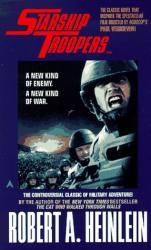
Starship Troopers exemplifies the signature writing style of Heinlein: an outrageous setting that still manages to capture familiar aspects of everyday life. I marveled at the intricate universe Heinlein crafts. He describes every aspect of political relations with alien species and the intricacies of a military that ranges across the stars. The book follows a boy named Juan Rico as he comes of age and joins the infantry. Heinlein describes every aspect of Juan’s life in basic training and the great battles of his career like an ancient epic; sparing no detail and giving elaborate descriptions of the enemies of humanity and the battles in which they were defeated. Starship Troopers is the perfect science fiction novel for someone who is looking for heaps of action combined with drops of philosophy and social commentary, all brought together into one spectacular and dazzling universe.
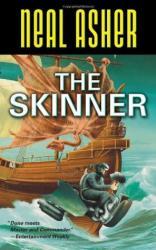
The Skinner is set in a distant future where science and technology have advanced to the point where humans live nearly infinite life spans and travel the stars with ease under the unified governance of the Polity. Neal Asher crafts a complex universe in which this story seems a miniscule part of a gargantuan timeline, I could spend countless wonderful hours studying the history preceding the novel! He crafts complex main characters: Janer, an employee of an insectoid hive mind; Erlin, a scientist with a strange past; and Keech, a reanimated corpse with unfinished business. The three unlikely acquaintances set out on the planet of Spatterjay, a world covered almost entirely with water, inhabited by humans known as hoopers who are infected with a virus that gives them superhuman strength and regeneration. When a mysterious hooper myth proves true, the intrepid visitors must work together to survive in an adventure-packed and mystery-filled journey with all the best elements of Robert Heinlein but with a 21st century audience in mind.
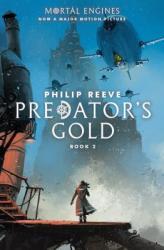
Taking place a few years after the events of Mortal Engines , I was aided somewhat in my read-through of Predator’s Gold by the fact that I didn’t have a movie to compare against. While the first book in this series helped set the stage, I felt the real story didn’t start until book two. After all, this series really is about the relationship between Hester and Tom. In Mortal Engines, they had only just met; in Predator’s Gold, we see how far they’ll go for each other, even if most of the story beats are somewhat predictable.
I appreciated how thoroughly real this ridiculous concept of monstrous towns roaming the world and devouring each other seems in this book. This post-apocalyptic setting felt thought-out by adding the main setting of Anchorage and the introduction of a charlatan author who cons everyone around him for his sole benefit. So often, an additional concept is added to the world-building, and I’d think, “That makes sense in this context.” I also appreciated how previous ideas were integrated into this story, showing how nothing is a “throwaway” idea.
Despite the excellent world-building, the root of this story is Hester and Tom’s relationship. While the more “romantic” elements were merely alluded to—as this is a series meant for children, after all—I was slightly annoyed with how stubborn these two characters were. If they’d been together for a few years, you’d think they’d have figured out some of these simple relationship issues before they become lynchpins tied to the survival of entire cities. I also felt the “will of God” was in a lot of the plot developments, as these two characters always seemed to be brought to the right place at the right time so they could continue to be together.
Excellent world-building with so-so character relationships, I give Predator’s Gold 3.5 stars out of 5.

Wow. OK. Maybe this series isn’t for children as much as I thought it was. Sure, a post-apocalyptic world has many subjects that can be considered dark—death being the main one—but Infernal Devices certainly went all in here and pushed the ugliness of humanity to the forefront of the plot. Of course, one wonders if the POV change to focus on the progeny of the two characters who comprised the first two books is part of why the tone of this book changed so drastically. Sure, there was violence in the previous two books; it just didn’t seem so gratuitous then. Aside from all the killing, which I suppose was meant to signify Hester’s character development, there wasn’t too much new in terms of world-building in this book. I appreciated all the developments in Mortal Engines and Predator’s Gold, but the addition of the African and Middle Eastern cities didn’t expound the “city-eat-city” world that much. Sure, there was more exploration of the Lost Boys concept, but it didn’t necessarily go any deeper than the basic idea presented in Predator’s Gold.
Despite the huge time gap between book two and Infernal Devices, I did find a few things to stand out in this part of the series. First was the epic battle between automatons. I felt the action in this scene, along with the other action scenes in this book, were well-described. Second, I don’t want to give away too much, but the twist ending was a bit of a shock—even if it made complete sense. For a series that usually hits many clichés and tropes of relationships, I was honestly shocked that the author went for this ending. Of course, the ending also leaves things unresolved enough to require another book, so there is that aspect to it which I can understand.
A jump ahead in time and the amount of violence, I give Infernal Devices 3.0 stars out of 5.
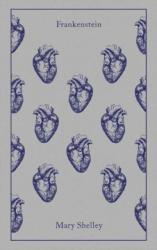
Frankenstein, or, the Modern Prometheus is a great gothic read. Like any other gothic novel, it is dark and mysterious, with elements of horror in it. While it had a rocky start for me, I soon got lost in the characters, with their wants and needs. The detail was amazing, while the wording was, em, very 17th century, but that makes the book no worse. All around, this is a riveting book that will capture your attention immediately.
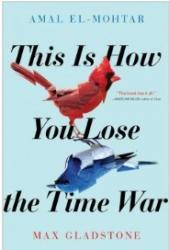
This time-travelling story of love and genocide centers on two rival agents battling to secure the best possible future for their warring factions. It opens with a blood-covered Red, the last woman standing on a battlefield heaped with corpses. She finds a letter that starts with “Burn Before Reading” from Blue, her rival whom she has spent lifetimes trying to thwart. So it starts with a taunt followed by a challenge scratched in a lava flow and a message woven into the DNA of a tree cut down by marauding armies. These spies never meet but these compromising letters – certain death if discovered by their superiors – build upon a mutual understanding that evolves into love. Who better to understand someone weary and confused by merciless, contradictory orders than their rival? Or is this an attempt to turn the other into a double agent? Or lay a deadly trap? This novella deftly avoids the confusion that spoils average time-travel yarns by making each of the chapters into a vignette, told from either Red or Blue’s perspective, until a satisfying, meaningful conclusion.
Awards: 2020 Nebula Award for Best Novella, 2020 Hugo Award for Best Novella
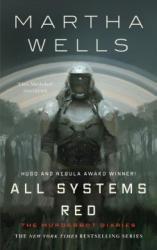
We all struggle to figure out who we are. It’s no different for a robot that’s managed to secretly override its governor unit and develop self-aware independence. The artificial construct, made up of regenerative organic and artificial parts, privately calls itself Murderbot out an emerging sense of guilt it tries to squash by watching hours of mindless TV. But even that distraction cannot keep a socially awkward, self-conscious entity from developing feelings about the humans it serves. That internal conflict is so realistic it is easy for the reader to forget it is an artificial construct narrating. Murderbot’s deadpan humor keeps the 2017 novella from bogging down and raises it well above a familiar action/corporate malfeasance plot. The novella is the first of a five-part series, all available through PPLD, with a full-length novel, Network Effect (May 2020) continuing Murderbot’s journey of self discovery and soap operas. A sixth series entry is scheduled for April 2021.
Honors: 2017 Nebula Award for Best Novella, 2018 ALA/YALSA Alex Award, 2018 Hugo Award for Best Novella, 2017 Philip K. Dick Award finalist.
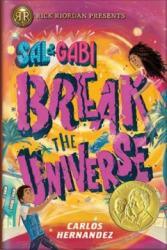
Welcome to ‘Sal and Gabi Break the Universe’, a book that will take you on an awesome universe-tearing adventure! This book will show the life of a middle-school magician, named Sal. I especially loved this book because of the time put into the descriptions of the magic tricks. Another thing that makes this book shine is the humor. There was enough humor in this book to keep me laughing the whole time I read it. This book is high up on my book list. I would suggest this to anyone, and I mean anyone.


